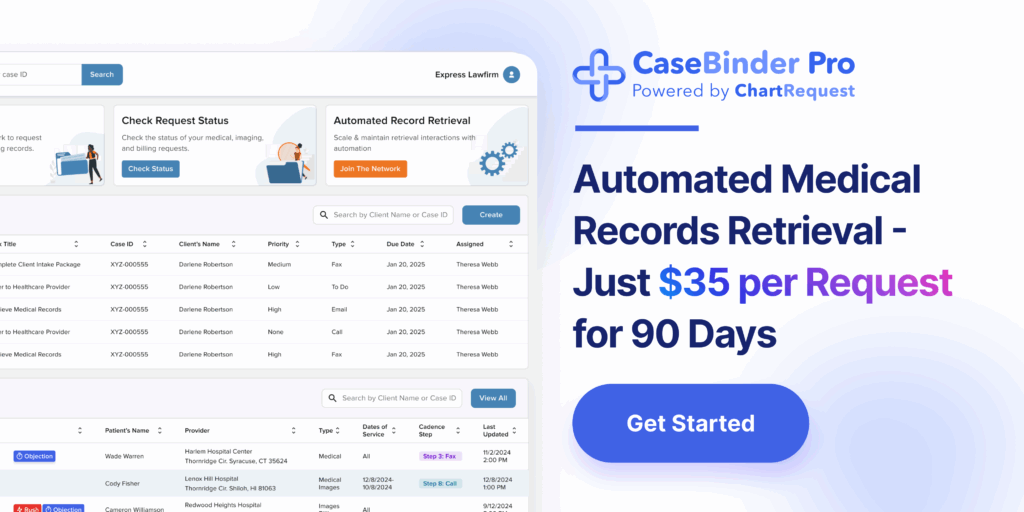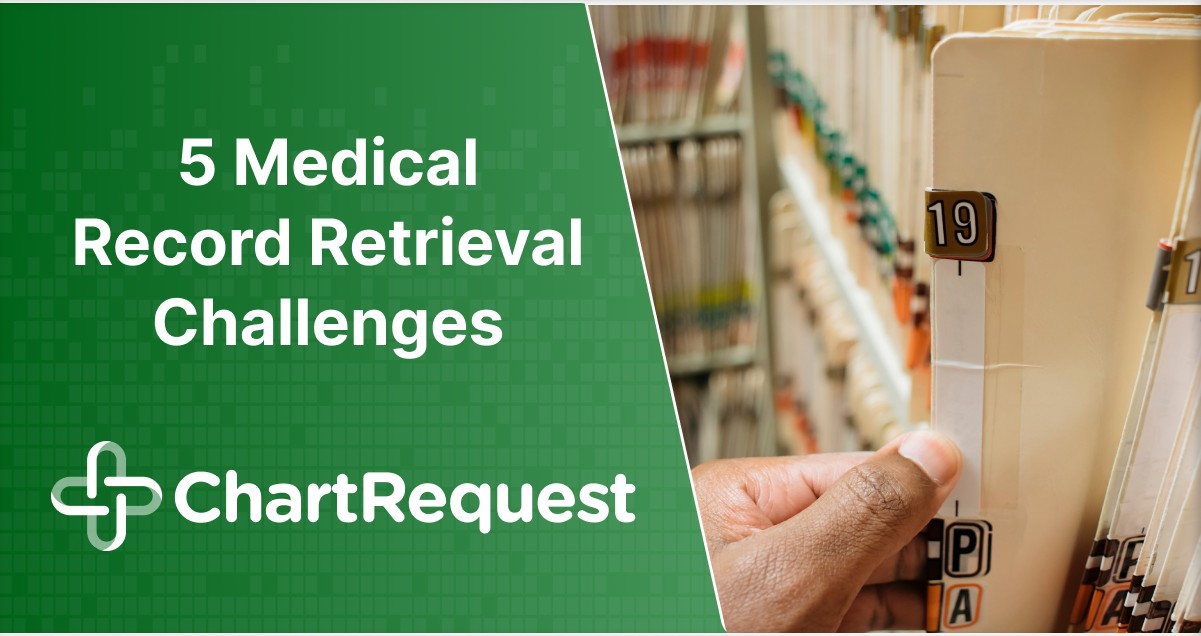Medical record retrieval challenges are widespread among law firms. If yo you handle personal injury, medical malpractice, or workers’ compensation cases, medical record mishaps can put you in hot water.
While accessing accurate and timely medical records impacts the outcome of a case, liaising with multiple healthcare providers and filling in countless HIPAA compliance requirement forms might weigh you down.
Let’s review some paralegal challenges you may face during record acquisition and how to resolve them.
Don’t let medical record retrieval burn you out — schedule a CaseBinder consultation today!
5 Major Challenges Law Firms Face in Medical Record Retrieval
The transfer of medical records is a complex workflow that may involve communication between multiple individuals. You may face obstacles in the process that slow down your access to client data:

1. Data Silos and Decentralization
Data silos are the result of large stores of digital information that aren’t easily accessible. Fragmented HIM systems often cause lengthy delays when acquiring a client’s medical report.
Several factors contribute to this issue, including:
- Limitations of EMR Systems: Most EMR systems are for internal use by healthcare providers and aren’t accessible to third parties. You might need to contact medical records clerks at different healthcare organizations to access this valuable data.
- Old Paper Records: Some healthcare providers still use paper-based records. Retrieving these records requires physical searches through archives and scanned pages, making the process time-consuming and costly.
- Off-Site Storage: Medical records archived or stored off-site may not be readily accessible. Such records often take additional time to retrieve because they may require travel. It’s easy for providers to de-prioritize such requests.
CaseBinder alleviates these problems by centralizing all requests in one convenient digital platform. This product lets you manage requests more effectively, track real-time progress, and reduce delays caused by scattered records.
2. Fax Machine Failure
Despite their widespread use, fax machines have a failure rate of about 5-8%. That’s a lot of missing records!
A doctor may misdial your firm’s number, blocking your access to the scan. Less tech-savvy custodians could also send the wrong size image, causing you to start the outreach process for a proper scan. These are not medical record retrieval challenges you want to deal with first thing in the morning.
Each failed fax will exacerbate your workload with repeated attempts and follow-ups, delaying case preparation. According to DirectTrust, approximately 30% of lab trials require retesting due to lost or missing faxes. Don’t assume your firm will be safe from this common problem.
Digital retrieval tools like CaseBinder provide the transparency that fax machines lack. These tools eliminate the need for clunky hardware and reduce risks during transfers. You can ensure instant transmission while reducing the instances of repeating the request process.
3. Navigating Automated Phone Trees
Automated phone trees can help direct calls to your law firm’s proper channels. However, few paralegals know how to set up an intuitive phone tree for healthcare record custodians. Inefficient systems may cause you to wait longer for documents.
On the other hand, you may need to navigate numerous hospital phone trees during requests.
We all know how tedious this process can be for a simple question. These primitive systems are time-consuming and frustrating, adding unnecessary delays to the already complex task of retrieving medical records.
The best way to bypass phone trees is to eliminate the calls. Electronic platforms enable your team to create and submit requests without touching the dial.
4. Status Updates and Follow-Up
How often do you push your limits to obtain client records after countless follow-ups?
Following up on record requests can feel like a real chore. The average request for records can take up to two hours of additional labor.
24/7 online status updates and a built-in provider chat are just two solutions CaseBinder offers for paralegals.
5. The Ever-Changing State and Federal Regulations
State and federal regulations regarding medical records are strict. Once a client’s records reach your firm, you are responsible for maintaining their security and privacy.
Keeping up with regulatory changes without a dedicated compliance system can be risky. Falling short will lead to severe monetary penalties or legal issues for your firm. In one prominent law firm data breach, hackers demanded $42 million to return compromised information.
The cost of copying medical charts is another significant challenge you may face. Each state dictates copy fees, and these rules are not static. Your attorney probably doesn’t want you spending a fortune on needless copies.
Fortunately, our platform monitors over 250 pricing algorithms to guarantee fair and accurate billing per state law.
CaseBinder Solves These Challenges and More
Client record retrieval doesn’t need to ruin your workday. Our electronic retrieval platform automates administrative burdens so you can focus on other tasks.
This product won’t replace you or what you do for attorneys! It will simply make the process easier to manage and complete without mishaps.
You may not be able to make the decision to purchase CaseBinder on behalf of your firm. Don’t worry — informing your office manager or admin team can be a great place to start.
Learn more about CaseBinder, and solve your medical record retrieval challenges today!


